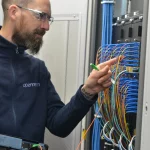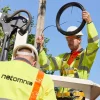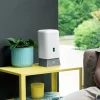Hyperoptic – A Quarter of UK Folk Regularly Argue About Poor Broadband
Fibre optic ISP Hyperoptic, which is rolling out a 1Gbps capable FTTP network to parts of 12 cities, has surveyed 3,000 UK residents and found that the average person spends 10.5 hours online a day (we assume that includes office work), while 24% also have “regular arguments” about poor broadband.
Apparently the main bugbear for those who do argue about their Internet connection occurs because someone is “hogging the broadband” (49%), while the next biggest cause was triggered by a desire to swap ISP (39%). Similarly the study found that 79% of respondents wanted a faster broadband speed, which indicates that this is perhaps not a customer survey of Hyperoptic’s base.
Advertisement
Naturally Hyperoptic has a vested interest here and would perhaps wish to point out that such arguments probably wouldn’t happen in a house with their ultrafast connectivity, unless of course you’ve got a big family and picked the cheapest 20Mbps package 🙂 . On the other hand only a tiny proportion of the UK can access their service, but that is slowly improving.
In the meantime 29% of respondents admitted that they actively try doing things to increase their own broadband speeds, such as turning off unneeded devices (59%) and or trying to move the router to a different location (42%); we assume to get better WiFi signal.
Steve Holford, Hyperoptic’s VP of Products, said:
“Smart home technologies have been in germination for a decade but in the last year consumer adoption has exploded, which has given rise to a increasing number of connected homes – and even more internet-reliant Brits.
As web dependency and usage rises exponentially, it’s understandably going to cause friction in houses where the broadband isn’t fit for task. There is nothing more frustrating than buying the world’s most advanced and functional tech, and then not being able to enjoy it. The key is not to take poor service lying down.”
Elsewhere the survey also found that 21% claim to already have a smart-home system installed, such as internet-controlled central heating, energy systems, security, smart appliances or lighting. A further 27% said that they plan to have a smart system installed at some point in 2016. Personally we prefer the old manual methods, which don’t brake as often.
The results also uncovered that men are spending the most time online, at an average of 11 hours a day, compared to women who are connected to the web for an average of 10 hours day. But that’s nothing new and is supported by other studies, such as from the Office for National Statistics.
Advertisement
Mark is a professional technology writer, IT consultant and computer engineer from Dorset (England), he also founded ISPreview in 1999 and enjoys analysing the latest telecoms and broadband developments. Find me on X (Twitter), Mastodon, Facebook, BlueSky, Threads.net and Linkedin.
« Church Could Boost Broadband for Homes Around Boston in Lincolnshire
















































Comments are closed